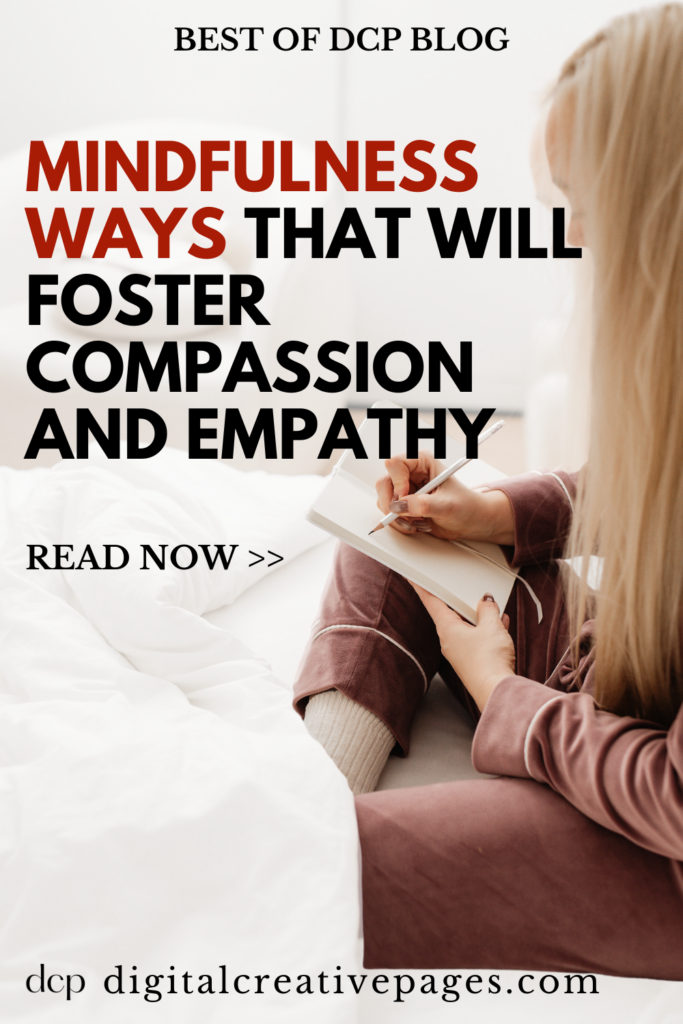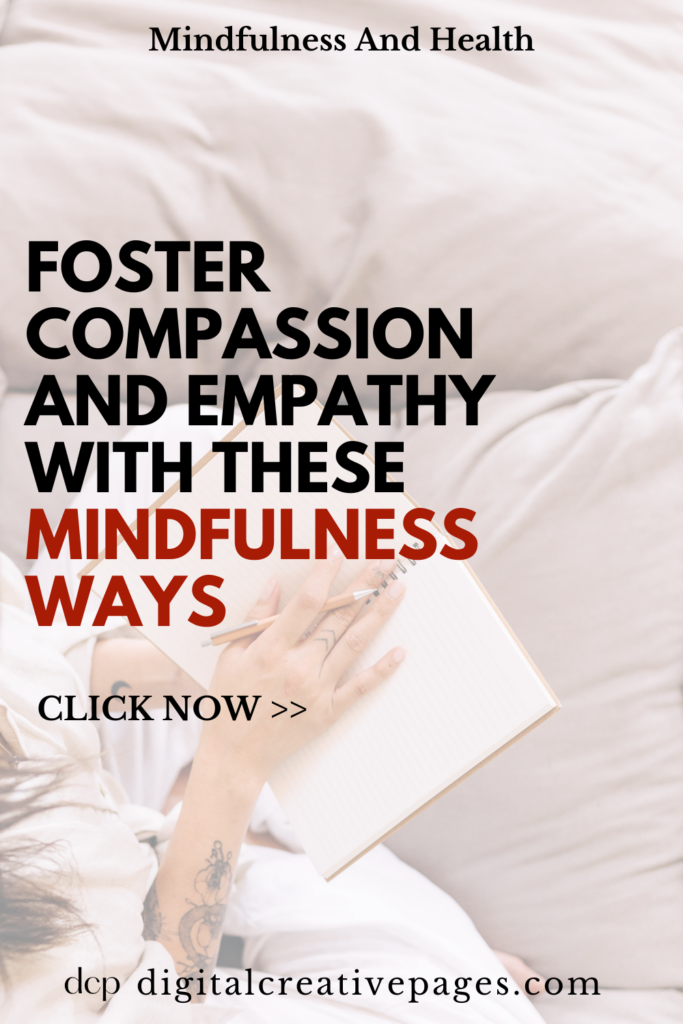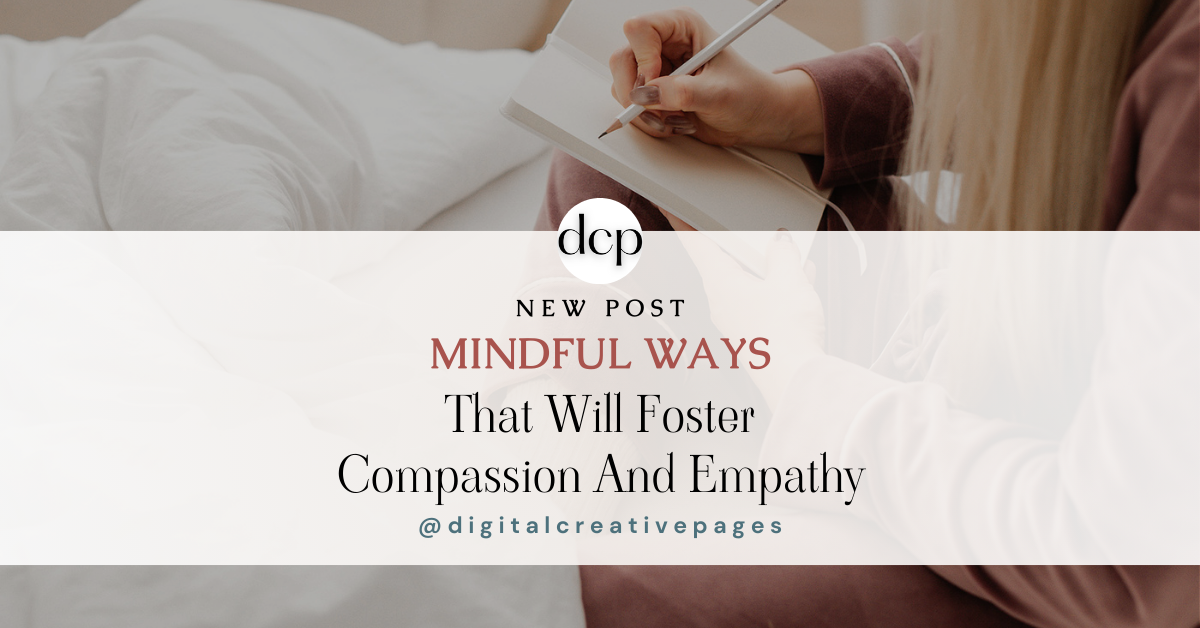Introduction
Mindfulness has become a buzzword, but it’s far more than just a trendy practice. It’s a way of tuning into the present moment, helping you connect with your thoughts, feelings, and the world around you. One of the most powerful benefits of mindfulness is its ability to grow your capacity for compassion and empathy. These mindful ways can transform your relationships, improve your mental health, and make you a kinder, more understanding person.
If you’ve ever wondered how mindfulness can help you nurture these qualities, keep reading. We’re diving deep into how this practice works and how you can use it in your daily life.
Pin this for later

1. Understanding Mindfulness as the Foundation for Compassion
Mindfulness is the practice of being present, aware, and non-judgmental. When you’re mindful, you’re fully engaged in the here and now, without letting your mind wander into worries about the past or future. This mental clarity creates space for compassion to grow. By focusing on the present, you’re better able to notice and acknowledge others’ emotions, even subtle cues. Understanding mindfulness is the first step to unlocking your potential for deeper empathy. It’s not just about meditation; it’s about how you interact with the world.
Benefits of mindfulness for compassion:
- Reduces judgmental thinking.
- Improves emotional regulation.
- Increases awareness of others’ feelings.
- Creates space for thoughtful responses instead of knee-jerk reactions.
- Helps you connect with others more deeply.
Pro tip: Start small by dedicating just 5 minutes a day to mindfulness. Over time, you’ll find it easier to stay present in conversations and interactions.
2. The Link Between Self-Compassion and Empathy for Others
Before you can truly be compassionate toward others, you need to be kind to yourself. Self-compassion means treating yourself with the same care and understanding you’d offer a friend. Mindfulness helps you notice negative self-talk and replace it with gentler, more supportive thoughts. This practice doesn’t just improve your self-esteem—it also makes you more understanding of others. When you’re less harsh on yourself, you’re less likely to judge others harshly, too.
How self-compassion boosts empathy:
- Encourages kindness over criticism.
- Builds emotional resilience.
- Fosters a sense of shared humanity.
- Enhances your ability to forgive and move on.
- Strengthens your emotional connections with others.
Pro tip: Whenever you catch yourself in a cycle of self-criticism, pause and ask, “What would I say to a friend in this situation?” Then, say those kind words to yourself.
3. Mindful Listening: A Key to Better Relationships
Mindful listening is about giving someone your full attention without distractions or judgments. How often do you find yourself half-listening while planning your response? Practicing mindful listening can change that. When you truly listen, you validate the other person’s feelings and create a safe space for open communication. This builds trust, deepens connections, and allows you to respond with empathy.
Steps to practice mindful listening:
- Put away your phone or other distractions.
- Maintain eye contact to show you’re present.
- Focus on the speaker’s words, tone, and body language.
- Pause before responding to process what you’ve heard.
- Avoid interrupting or jumping to conclusions.
Pro tip: Before a conversation, take three deep breaths to center yourself. This small ritual prepares you to be fully present and attentive.
4. Recognizing Emotional Triggers Through Mindfulness
We all have emotional triggers—those moments when something someone says or does sets us off. Mindfulness can help you recognize these triggers before they spiral into negative reactions. When you’re mindful, you can pause, identify the feeling, and choose a compassionate response. This doesn’t mean suppressing your emotions; it means managing them in a way that fosters understanding rather than conflict.
How to use mindfulness for emotional awareness:
- Notice physical sensations when you’re upset, like a tight chest or clenched jaw.
- Acknowledge the emotion without judgment (e.g., “I feel angry right now”).
- Reflect on why you feel triggered—is it about the current situation or something deeper?
- Choose a response that aligns with your values.
- Practice self-care after emotional moments to recharge.
Pro tip: Keep a journal of your emotional triggers and how you respond. Over time, you’ll notice patterns and gain insight into how to handle these situations with more compassion.
5. Using Loving-Kindness Meditation to Foster Compassion
Loving-kindness meditation is a powerful mindfulness practice specifically designed to cultivate compassion. During this meditation, you silently repeat phrases like “May I be happy, may I be healthy, may I live with ease.” Then, you extend those wishes to others, including loved ones, acquaintances, and even people you struggle with. This practice helps you develop a genuine sense of care for others and reduces feelings of anger or resentment.
Steps for loving-kindness meditation:
- Sit comfortably and close your eyes.
- Begin with yourself by repeating positive affirmations.
- Gradually extend these affirmations to loved ones, neutral parties, and difficult people.
- Focus on the feelings of warmth and kindness that arise.
- End by sending loving-kindness to all beings.
Pro tip: If you find it challenging to extend kindness to someone who’s hurt you, start small. Wish them peace or ease, even if you’re not ready for full forgiveness yet.
6. Practicing Non-Judgmental Awareness
Judgment often stands in the way of empathy. Whether it’s judging yourself or others, this habit creates emotional distance. Mindfulness teaches you to notice judgments as they arise and let them go. When you approach situations with curiosity rather than judgment, you open the door to understanding and compassion.
How to reduce judgment with mindfulness:
- Notice when judgmental thoughts pop up and label them (“That’s a judgment”).
- Replace judgments with observations (e.g., “This is what’s happening right now”).
- Reflect on the impact of judgmental thinking on your relationships.
- Practice acceptance of things you cannot control.
- Focus on shared experiences rather than differences.
Pro tip: Use the phrase “I wonder…” to shift from judgment to curiosity. For example, “I wonder why they acted that way” invites empathy instead of criticism.
7. Enhancing Emotional Regulation Through Mindfulness
Mindfulness strengthens your ability to regulate emotions, which is crucial for cultivating empathy. When you’re emotionally grounded, you’re better equipped to handle conflicts and offer support to others. Emotional regulation doesn’t mean ignoring your feelings; it means acknowledging them and responding thoughtfully.
Mindfulness techniques for emotional regulation:
- Use deep breathing to calm your nervous system during stress.
- Practice body scans to identify where emotions manifest physically.
- Pause and name the emotion you’re feeling.
- Reflect on whether your reaction aligns with your long-term goals.
- Use grounding techniques to stay present in emotional situations.
Pro tip: Try the “STOP” technique: Stop, Take a breath, Observe what’s happening, and Proceed with intention. This quick mindfulness exercise can prevent emotional outbursts.
8. Mindful Acts of Kindness in Daily Life
Compassion isn’t just about big gestures—it’s also about small, mindful acts of kindness. These moments of thoughtfulness can make a huge difference in someone’s day and deepen your sense of connection. Whether it’s holding the door open for a stranger or offering a kind word to a colleague, these acts reinforce empathy.
Ideas for mindful acts of kindness:
- Compliment someone genuinely.
- Offer to help a friend or neighbor with a task.
- Practice gratitude by thanking someone for their efforts.
- Smile at a stranger or say hello.
- Leave a kind note for a loved one.
Pro tip: Set a daily intention to perform one mindful act of kindness. Over time, this practice will become second nature.
9. Building Empathy Through Shared Experiences
Mindfulness helps you tune into the shared human experience, which is at the heart of empathy. When you recognize that everyone has struggles, fears, and hopes, it’s easier to relate to others. This perspective fosters kindness and breaks down barriers.
Ways to connect through shared experiences:
- Reflect on times when you’ve felt similar emotions to someone else.
- Practice perspective-taking by imagining what it’s like to walk in their shoes.
- Seek out opportunities to engage with people from different backgrounds.
- Share your own experiences vulnerably to build trust.
- Focus on what you have in common rather than differences.
Pro tip: When talking to someone, use phrases like “That sounds really tough” or “I’ve felt that way before.” These small acknowledgments go a long way in showing empathy.
10. Turning Mindfulness Into a Lifelong Practice
The beauty of mindfulness is that it’s a skill you can keep improving over time. The more consistent you are, the more naturally compassion and empathy will flow in your daily life. Mindfulness isn’t about perfection—it’s about showing up, being present, and learning from each experience.
Tips for sustaining a mindfulness practice:
- Create a routine by practicing mindfulness at the same time each day.
- Explore different techniques, like meditation, mindful walking, or yoga.
- Use mindfulness apps or guided meditations to stay motivated.
- Reflect on how mindfulness has improved your relationships and well-being.
- Join a mindfulness group or community for support.
Pro tip: Remember that even a few moments of mindfulness each day can make a big difference. Be patient with yourself and celebrate small victories.
Final Thoughts
By practicing mindfulness, you can cultivate compassion and empathy that enrich your relationships and make the world a kinder place. These qualities don’t just benefit others—they also bring you a greater sense of fulfillment and connection. So take a deep breath, be present, and let mindfulness guide you toward a more compassionate life. The journey is worth it, and it starts right now.
MY TOP POSTS
- 15 Small Business Ideas To make You Rich
- Social Media Marketing That Will Make Your Business Soar
- 6 Free Sites For Aesthetic Pictures For Your Blog
- Earn Money In Digital Marketing With No Experience
- SEO Keywords 101 – How To Find Power Words Now
- Blog Post Ideas That Will Attract Your Audience
- Pinterest Affiliate Marketing – That Will Turn Pins Into Money
Stay connected outside my social media with my weekly Newsletter – Digital Content Pages
My introducer post – check out why I chose Showit as my website builder here
Use my code DCP to get one 1.5 months free on Showit
Get all the resources for your social media and digital marketing without breaking the bank from my DCP Shop here
Pin this for later

By signing up for my freebies, you are agreeing that I can use your email address to market to you. You can unsubscribe from marketing emails at any time by using the link in my emails.
Previous post
next post
Search + Enter
meet nila
Hi. I am
Nila
Beta reader, book editor, Pinterest manager, Showit VA
I’m a beta reader and book editor and PA for authors, specializing in story clarity and developmental feedback. I run a sustainable online business that keeps working for me 24/7.
Along with this, I offer Pinterest management for overwhelmed creatives and entrepreneurs and set up and customize Showit templates when the tech side gets too overwhelming.
My Shop
Buy now
i need it
Free Stuff
get the goods
check it out
My Favorites
apps + Tools
Yes, please
Handpicked Links
Excited to get started? Me too!
i can't wait to
Connect with you
Let's discuss how best I can help you and your business
find your way around
about
for authors
Showit
shop
Blog
freebies
Contact
elsewhere
X
Copyright © 2024 - 2026 Digital Creative Pages | All Rights Reserved | Terms & Conditions | Privacy Policy
Website Template by Digital Creative Pages.
Photos by Styled Stock Society
Subscribe here for weekly Canva & Social Media tips and 10% off in my shop
